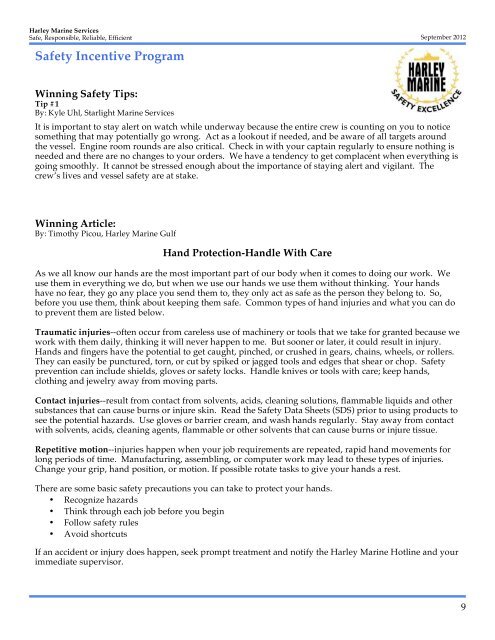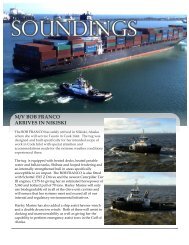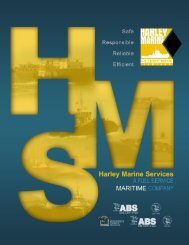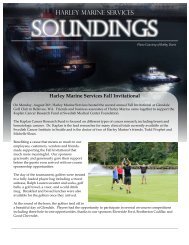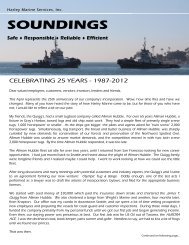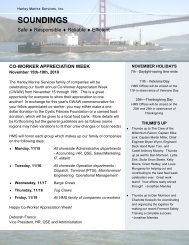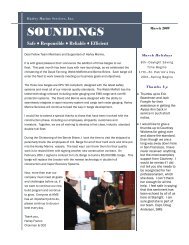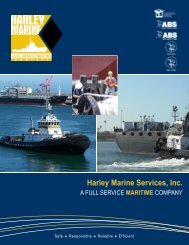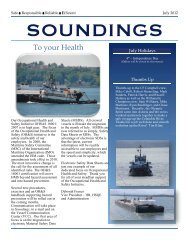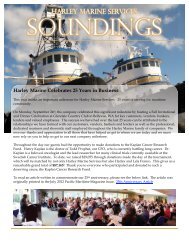September - Harley Marine Services, Inc.
September - Harley Marine Services, Inc.
September - Harley Marine Services, Inc.
Create successful ePaper yourself
Turn your PDF publications into a flip-book with our unique Google optimized e-Paper software.
<strong>Harley</strong> <strong>Marine</strong> <strong>Services</strong><br />
Safe, Responsible, Reliable, Efficient<br />
Safety <strong>Inc</strong>entive Program<br />
<strong>September</strong> 2012<br />
Winning Safety Tips:<br />
Tip #1<br />
By: Kyle Uhl, Starlight <strong>Marine</strong> <strong>Services</strong><br />
It is important to stay alert on watch while underway because the entire crew is counting on you to notice<br />
something that may potentially go wrong. Act as a lookout if needed, and be aware of all targets around<br />
the vessel. Engine room rounds are also critical. Check in with your captain regularly to ensure nothing is<br />
needed and there are no changes to your orders. We have a tendency to get complacent when everything is<br />
going smoothly. It cannot be stressed enough about the importance of staying alert and vigilant. The<br />
crew’s lives and vessel safety are at stake.<br />
Winning Article:<br />
By: Timothy Picou, <strong>Harley</strong> <strong>Marine</strong> Gulf<br />
Hand Protection-Handle With Care<br />
As we all know our hands are the most important part of our body when it comes to doing our work. We<br />
use them in everything we do, but when we use our hands we use them without thinking. Your hands<br />
have no fear, they go any place you send them to, they only act as safe as the person they belong to. So,<br />
before you use them, think about keeping them safe. Common types of hand injuries and what you can do<br />
to prevent them are listed below.<br />
Traumatic injuries--often occur from careless use of machinery or tools that we take for granted because we<br />
work with them daily, thinking it will never happen to me. But sooner or later, it could result in injury.<br />
Hands and fingers have the potential to get caught, pinched, or crushed in gears, chains, wheels, or rollers.<br />
They can easily be punctured, torn, or cut by spiked or jagged tools and edges that shear or chop. Safety<br />
prevention can include shields, gloves or safety locks. Handle knives or tools with care; keep hands,<br />
clothing and jewelry away from moving parts.<br />
Contact injuries--result from contact from solvents, acids, cleaning solutions, flammable liquids and other<br />
substances that can cause burns or injure skin. Read the Safety Data Sheets (SDS) prior to using products to<br />
see the potential hazards. Use gloves or barrier cream, and wash hands regularly. Stay away from contact<br />
with solvents, acids, cleaning agents, flammable or other solvents that can cause burns or injure tissue.<br />
Repetitive motion--injuries happen when your job requirements are repeated, rapid hand movements for<br />
long periods of time. Manufacturing, assembling, or computer work may lead to these types of injuries.<br />
Change your grip, hand position, or motion. If possible rotate tasks to give your hands a rest.<br />
There are some basic safety precautions you can take to protect your hands.<br />
• Recognize hazards<br />
• Think through each job before you begin<br />
• Follow safety rules<br />
• Avoid shortcuts<br />
If an accident or injury does happen, seek prompt treatment and notify the <strong>Harley</strong> <strong>Marine</strong> Hotline and your<br />
immediate supervisor.<br />
9


